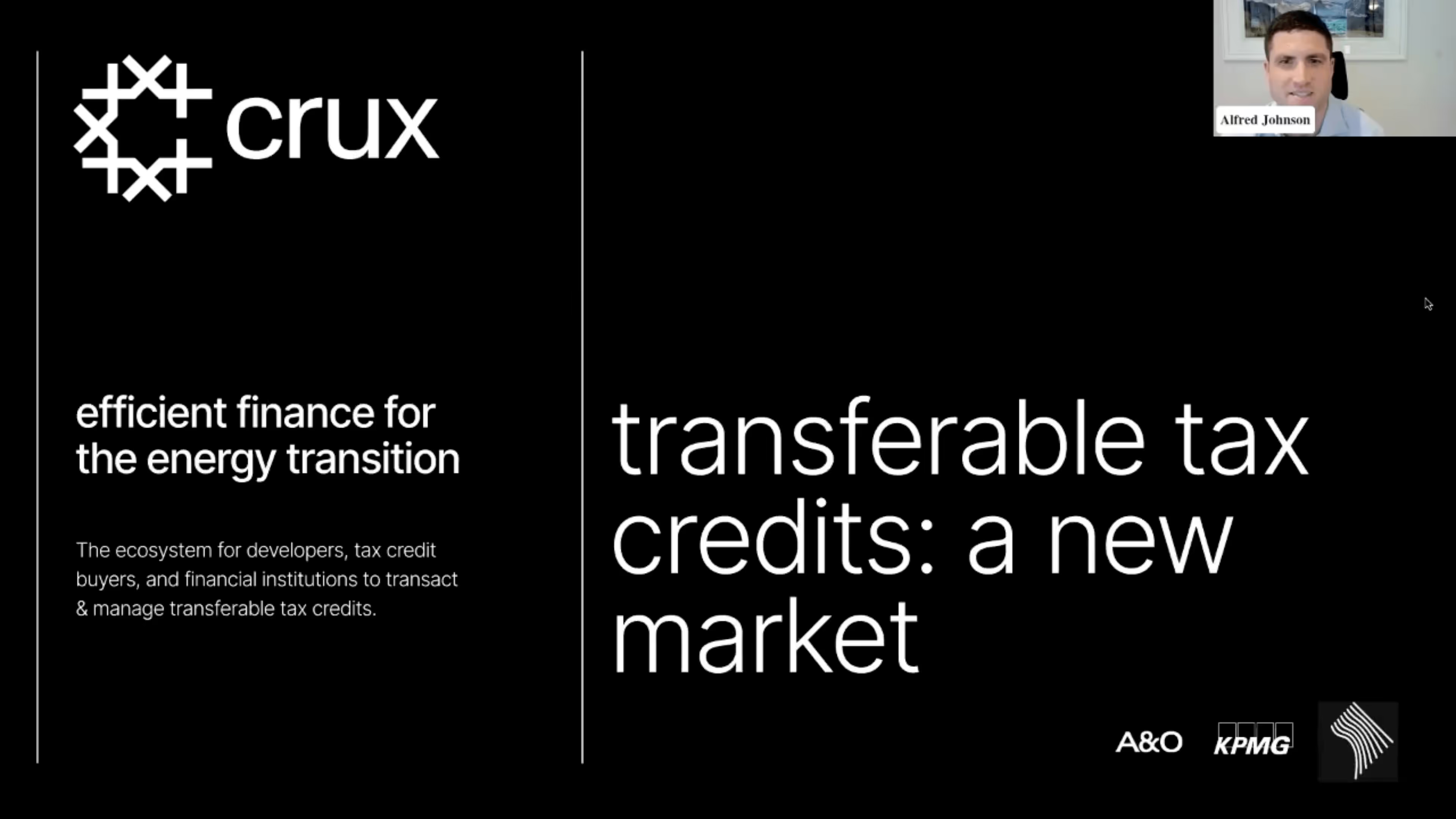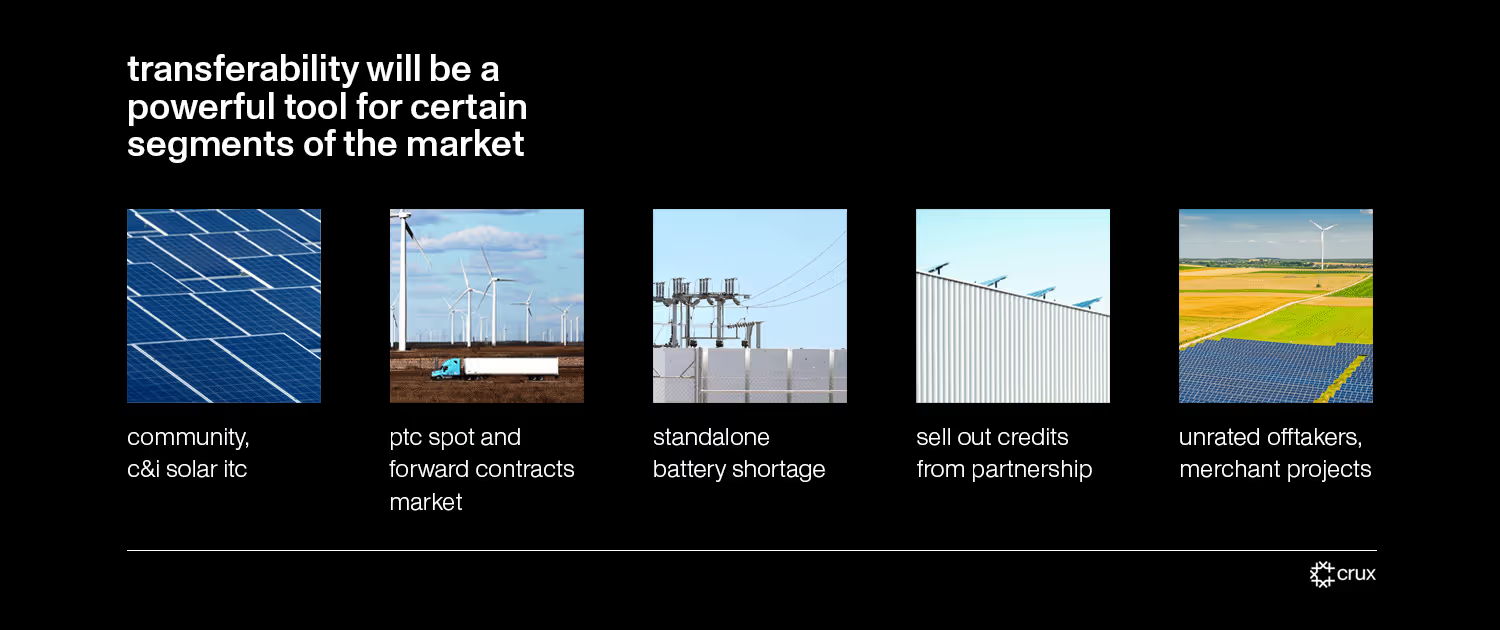
We hosted a webinar on April 26 to discuss the growing market for transferable clean energy tax credits alongside tax, legal, and energy experts John Marciano, Co-Head of the Global Energy Practice at Allen & Overy; Sam Kamyans, Partner at Allen & Overy; Michael Orlando, Managing Director at KPMG; and Mike Carr, Partner at Boundary Stone Partners.
People joined from every corner of the market: developers, tax credit buyers, advisors, and intermediaries. The organizations represented on the call collectively represent tens of billions of transferable credit supply and demand.
As John Marciano of Allen & Overy explained, tax experts have worked for years to create complex structures to transact credits through tax equity, but the Inflation Reduction Act will change the game by scaling the availability of credits and streamlining transactions for all parties.
Note this is Crux's general summary of the webinar event and does not reflect tax advice or a summary from the panelists.
The Inflation Reduction Act (IRA) is projected to lead to ~$85B per year in tax attributes to be transacted by 2031. This volume represents a five-fold increase from today and would consume an estimated ~16% of all CBO-estimated corporate tax liabilities when the market reaches maturity.
Early market participants are expected to include developers with projects for whom tax equity was suboptimal: storage, community solar, merchant projects – developers who value certainty and simplicity. Other project types beyond storage and generation, such as biofuels, will likely also use transferability as a primary financing mechanism.

Production tax credits (PTCs) are also anticipated to be an especially attractive candidate for transferability, given limited risks on valuation and basis, recapture, and the ability to sell them in closer-to-real time in a spot market.
There are a number of situations where people are already transferring credits out of existing tax equity partnerships – for example, because new enhanced tax credits are increasing credit value beyond what existing tax equity partners could absorb.
Transferability is also seen as a powerful fall back and escape valve. People are sizing tax equity commitments more conservatively, knowing that there is an emerging market to sell transferable credits as needed.
Kamyans and Marciano explained that a hybrid transaction enables a sponsor to sell tax credits that are often not monetized in a traditional tax equity partnership structure.
Treasury has indicated that guidance on transferable tax credits will be issued by Q2 2023.
Republican House members have proposed a bill that repeals parts of the Inflation Reduction Act and the newly-transferable tax credits. Panelists did not expect any major sections of IRA repeal to become law, as Republicans will have to negotiate a debt ceiling deal with Senate Democrats and President Biden. Additionally, repealing the IRA’s new transferability mechanism may be politically challenging for Congressional Republicans, as one analysis of the IRA tax credits found that traditionally Republican states will uniquely benefit due to their strong renewable energy potential and industrial activity.
While pricing is still being set as the market begins to grow, current pricing ranges between 85-95¢ per dollar. Pricing depends on sponsor credit, insurance, technology category, and other factors. We’ll also be rolling out a pricing survey in the coming weeks to inform the conversation with real data as to how deals are being structured and at what prices.
Crux is designed to meet the needs of all parties in transferable tax credit transactions:
Our network and tools will help all parties streamline the transaction process, access a large & liquid market, and reduce risk through our tools and advisory partners – facilitating more and cheaper transactions that achieve internal goals and accelerate the energy transition.
We are currently working with buyers and sellers to transact credits as we build out a full suite of tools to grow the market and streamline transactions. We’re also rapidly expanding the number of partners and participants we work with – if you’re ready to get started, get in touch today.
